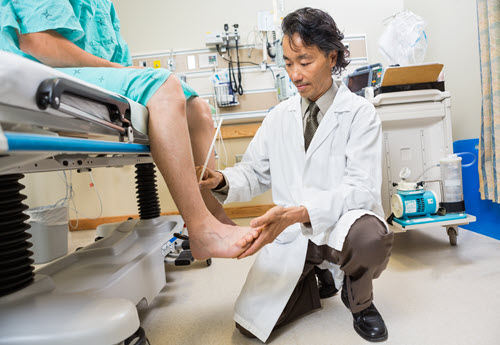 If you are experiencing symptoms such as memory loss, tremors, balance problems, pain, or recurrent headaches, your primary care Doctor may recommend that you be seen by a Neurologist.
If you are experiencing symptoms such as memory loss, tremors, balance problems, pain, or recurrent headaches, your primary care Doctor may recommend that you be seen by a Neurologist.
Neurologists specialize in the diagnosis and management of conditions affecting the brain and nerves. This article will define what a Neurologist is and discuss what their work entails. We will additionally answer common questions about Neurologists and the Medical specialty of Neurology.
Here are the 8 most frequently asked questions about Neurologists. Click on the quick navigation links below to find the answers.
- What is a Neurologist?
- What does a Neurologist do?
- What conditions and disorders does a Neurologist treat?
- What is educational path for Neurologists?
- Does a Neurologist perform brain surgery?
- Neurologist vs Neurosurgeon - What's the difference?
- How has Covid affected Neurology Practice?
- What are recent innovations in Neurology practice?
What is a Neurologist?
Neurologists are Allopathic or Osteopathic trained physicians that study the medical specialty of Neurology and specialize in the treatment of diseases and conditions affecting the brain, nerves, spinal cord and muscles. Medical conditions that Neurologists commonly treat include:
- Migraines and recurrent headaches
- Concussions
- Parkinson's disease
- Stroke
- Epilepsy
- MS - Multiple Sclerosis
- Alzheimer's disease
What Does a Neurologist Do?
Neurologists diagnose the underlying cause of neurological disorders, prescribe medication, order diagnostic tests, conduct physical exams, perform in office procedures and create strategies to treat neurological conditions. They take care of patients of all ages and work in medical facilities including inpatient hospitals and outpatient clinics.
An initial Neurological exam closely examines a person's nervous system and mental status paying special attention to the nerves and brain. Some common in office procedures utilize simple testing tools such as a reflex hammer and a pen light. In addition, a detailed medical history will be taken including an evaluation of:
- Speech
- Motor Skills
- Visual acuity and extraocular muscles
- Coordination
- Strength
- Reflexes
Based upon the outcome of these in office evaluations, a Neurologist may then order additional tests and procedures such as:
- Blood and urine tests
- Imaging of the brain or spine with MRI or CT scans
- EEG (electroencephalograph) for evaluating brain function
- EMG (electromyography) to evaluate nerve and muscle communication
- Tensilon test to evaluate Myasthenia Gravis disorders

|

|
What are the most common neurological disorders that neurologists treat?
Neurology doctors treat a wide variety of neurological health disorders in patients of all ages. The top five most frequently encountered conditions that neurologists treat are:
- Headache- There are several types of headaches including: migraine headache (with and without aura), cluster headaches and tension headaches. All chronic headache types can cause severe pain and interfere with daily life. A neurologist physician can help to reduce the number of headaches and provide prescription medicine to treat symptoms.
- Epilepsy/seizures- Epilepsy and seizure disorders can be congenital (present from birth) or acquired. They occur due to abnormal activity in the brain. Seizures greatly interfere with daily life and can even cause brain damage. Neurology physicians can prescribe medicine to prevent and treat seizures.
- Stroke- A stroke is an emergency situation in which part of the brain's blood supply is cut off. Immediate medical care by a Neurologist is required to limit the damage to the brain.
- Dementia- Dementia is a general term for several medical conditions of the brain that cause symptoms of memory loss, problem solving and critical thinking. Neurologists can help take care of patients with this disorder by prescribing medicine to reduce symptoms.
- Parkinson's disease- Parkinson's disease is a nervous system disorder in which there are decreased levela of a hormone called dopamine. This can lead to tremor, stiffness, and changes in critical thinking. Neurologists can prescribe medications to reduce the nervous system symptoms of Parkinson's.
What is the educational path to start a career in Neurology?
The education required to become a neurologist is very rigorous. First, one must complete a college bachelor’s degree. This is followed by obtaining a medical degree from either an Osteopathic Medical Program (D.O. degree) or an Allopathic Medical program (M.D. degree). This requires at least four years to complete. Upon graduation, students are officially a Doctor but their training is not complete. After medical school, one must match into a one year transitional or preliminary year. This year is spent training in the hospital in many different specialties. After the year is complete, individuals apply to a neurology residency training program. Most neurology residency programs are three years in duration and are associated with at least one hospital or medical school. During or shortly after residency, a neurologist must pass board health examinations to be a fully qualified neurologist. After residency, individuals have the option of completing a fellowship in a specialty field of study. Fellowships are at least one year and allow individuals to further specialize into a specific section of neurology.
Discover if a career in Neurology is right for you.
Learn why 86% of doctors would choose the same specialty again.
Do Neurologists do surgery?
No, Neurologists do not perform surgery. However, they may refer a patient that requires surgical treatment to a specialist such as a spine surgeon or a neurosurgeon.

|

|
Neurologist vs Neurosurgeon - What is the difference in patient care?
What is a neurologist and what is a neurosurgeon? While a neurologist and a neurosurgeon both treat and take care of conditions of the brain and nervous system, they are very different. Neurologists complete a four year residency and primarily treat neurological disorders with non-surgical treatment. Neurosurgeons on the other hand, complete a seven year residency and treat neurological conditions primarily with surgery. Both medical specialists may care for and treat the exact same neurological condition, but a neurologist may use medicine while a neurosurgeon will perform surgery. Neurologists may work in the hospital seeing hospitalized patients or in an outpatient clinic setting. Neurosurgeons spend their time in the hospital operating rooms and in a medical clinic setting taking care of patients for pre-operative and post-operative visits.
What is the impact on Neurology from Covid?
Since the beginning of 2020, COVID-19 has had a huge impact on jobs nationwide. Physicians and other healthcare related jobs are no exception. Overall, medical practices in the U.S. report a fifty-five percent decrease in revenue and a sixty percent decrease in average patient volume since the beginning of the COVID-19 crisis. Due to this drastic decrease in revenue, medical practices and hospitals have furloughed and laid off employees including 43,000 healthcare workers in March 2020 alone. Nine percent of independent medical practices state they have at least temporarily closed their practices. As social distancing guidelines remain in effect, remote patient engagement has soared and increased by an astounding two hundred twenty five percent.
As neurologists commonly have stand-alone practices separate from a hospital, many locations were forced make drastic changes to their practice in order to prevent the location from closing. One practice in Oregon detailed that during the month of March 2020, billing was only 60 percent of the estimated trend based on the previous month. The practicing neurologists in the group were forced to take a 40 percent pay cut, and a quarter of their staff was furloughed. This occurrence was commonplace in neurology practices across the US. Although telemedicine has helped to increase revenue at many neurology practices, there are many patients who cannot or refuse to have virtual visits with their neurologist. However, there is hope that neurology patient visits will bounce back, perhaps with and even high number of visits due to COVID related lasting neurological nervous system effects.
What are recent innovations in neurology practice?
In 2018, the FDA cleared a new noninvasive method of detecting brain abnormalities including hemorrhagic stroke, trauma, and swelling. This device called the Cerebrotech visor, measures the changes in distribution of cerebral fluid in the head. The machine is programmed with advanced algorithms that can use the data collected to research and detect the abnormalities aforementioned in a noninvasive manner. This also may help to reduce the number of CT scans needed to diagnose these neurological and nervous system conditions, thus saving patients from exposure to radiation and reducing potential kidney insult from contrast use.
Another innovation in neurology is the use of monoclonal antibodies to treat multiple sclerosis (MS). Multiple Sclerosis disease occurs due to a defect in the immune system, causing it to attack a portion of the nerve in the nervous system called a myelin sheath. This results in communication difficulties between nerves and the brain leading to deterioration or even death in some individuals. A subset of individuals with MS are diagnosed with a particular disease type termed primary-progressive MS. Previously, there was no treatment to reduce disability for this particular type of multiple sclerosis. A lot of research has been conducted looking to provide a treatment for this disease. In 2017 the FDA cleared Ocrelizumab, an anti-CD20 antibody making it the first and only treatment for primary-progressive multiple sclerosis and a landmark innovation in the neurology field.

Callie Torres is a resident physician working at a top tier institute in the Midwest. She is a freelance health and medical writer as well as an author of many peer reviewed medical articles. She additionally serves as a Captain in the United States Air Force.

















